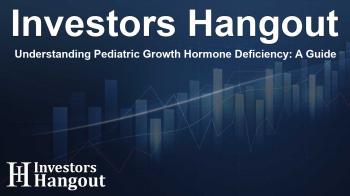Understanding Pediatric Growth Hormone Deficiency: A Guide

Introduction to Pediatric Growth Hormone Deficiency
Pediatric growth hormone deficiency (PGHD) is a condition that, although relatively rare, affects a significant number of children. Statistics reveal that it impacts about 1 in 4,000 to 10,000 children. Understanding PGHD is crucial for parents, as it can influence a child’s growth, development, and overall health outcomes.
What is Pediatric Growth Hormone Deficiency?
The Role of Growth Hormone
Growth hormone is essential in childhood for proper physical development, including muscle metabolism, bone growth, and fat breakdown. When a child’s pituitary gland does not produce adequate growth hormone, this leads to PGHD, resulting in noticeable changes in height and growth patterns.
Physical Indicators of PGHD
Children with PGHD may exhibit a range of physical traits, appearing younger than their peers and experiencing delayed puberty. They may also struggle with muscle development and bone strength due to insufficient growth hormone levels.
Identifying Symptoms of PGHD
Early Signs to Watch For
In some cases, symptoms of PGHD can be evident during infancy, while others may only appear later in childhood. Common signs include slower than normal growth, immature physical appearance, and related factors such as late teeth eruption, sparse body hair, and episodes of hypoglycemia.
Risk Factors Associated with PGHD
Certain factors increase the risk of developing PGHD, including previous brain injuries, brain tumors, or radiation treatments involving the head. Additionally, genetic predispositions may play a role in a child's likelihood of experiencing this condition.
Diagnosis of Pediatric Growth Hormone Deficiency
Diagnostic Procedures
Diagnosis typically involves thorough evaluation to rule out other possible reasons for slow growth, such as genetic short stature or conditions affecting nutrition. X-rays to evaluate bone age or growth hormone stimulation tests are common methods used in diagnosing PGHD.
Treatment Options for PGHD
Working with Endocrinologists
Upon confirmation of a PGHD diagnosis, children often collaborate closely with endocrinologists to develop tailored treatment plans. These usually include growth hormone replacement therapy and regular monitoring to ensure appropriate growth rates.
Importance of Early Treatment
Starting PGHD treatment early can significantly increase the chances of a child reaching a height consistent with his or her family’s stature. Advances in treatment have also shifted from daily injections to more manageable weekly options, making adherence more feasible for families.
Conclusion
Awareness and understanding of pediatric growth hormone deficiency are essential for parents. With proper diagnosis and timely intervention, children with PGHD can lead fulfilling lives, achieving their growth potential and maintaining overall health. For more information about PGHD, you can refer to reputable health resources.
Frequently Asked Questions
1. What causes Pediatric Growth Hormone Deficiency?
PGHD occurs when the pituitary gland does not produce enough growth hormone, affecting physical and emotional development.
2. How is PGHD diagnosed?
Diagnosis involves ruling out other growth issues and may include tests such as X-rays and growth hormone stimulation tests.
3. What are the long-term effects of PGHD?
If untreated, PGHD can lead to short stature and potential psychosocial issues, as well as increased risk of osteoporosis.
4. Are there specific treatments available for PGHD?
Yes, children with PGHD can benefit from growth hormone replacement therapy and regular monitoring by healthcare professionals.
5. When should parents seek help for growth concerns?
Parents should consult with pediatricians if they notice their child is significantly shorter than peers or exhibits delayed development signs.
About The Author
Contact Owen Jenkins privately here. Or send an email with ATTN: Owen Jenkins as the subject to contact@investorshangout.com.
About Investors Hangout
Investors Hangout is a leading online stock forum for financial discussion and learning, offering a wide range of free tools and resources. It draws in traders of all levels, who exchange market knowledge, investigate trading tactics, and keep an eye on industry developments in real time. Featuring financial articles, stock message boards, quotes, charts, company profiles, and live news updates. Through cooperative learning and a wealth of informational resources, it helps users from novices creating their first portfolios to experts honing their techniques. Join Investors Hangout today: https://investorshangout.com/
The content of this article is based on factual, publicly available information and does not represent legal, financial, or investment advice. Investors Hangout does not offer financial advice, and the author is not a licensed financial advisor. Consult a qualified advisor before making any financial or investment decisions based on this article. This article should not be considered advice to purchase, sell, or hold any securities or other investments. If any of the material provided here is inaccurate, please contact us for corrections.

